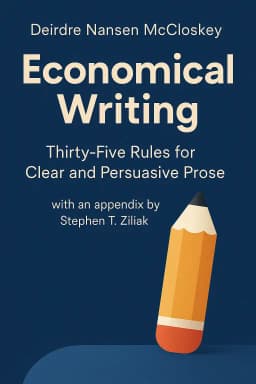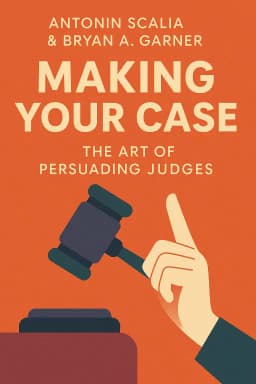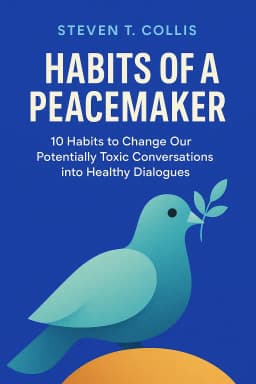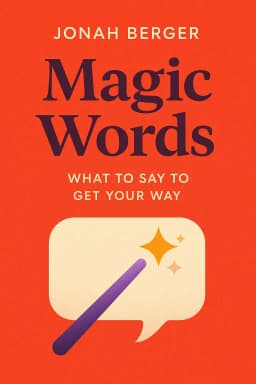
The Moral Case for Clear Writing
Golden Hook & Introduction
SECTION
Michelle: Most people think good writing is about having a big vocabulary. What if the secret is actually about shrinking it? What if the most powerful writers are the ones who know which words to kill? Mark: Whoa, that's a bold start. So you're saying I should throw out my thesaurus? My whole strategy is based on finding fancy synonyms to sound smart. Michelle: You might want to after today. That's the radical idea at the heart of Economical Writing: Thirty-Five Rules for Clear and Persuasive Prose by Deirdre Nansen McCloskey. Mark: McCloskey is a fascinating figure, right? A Harvard-trained economist who also holds professorships in history, English, and communication. She’s not your typical style guide author. Michelle: Exactly. And she argues that in fields like economics, bad writing isn't just ugly—it's an ethical failure. A view that was once considered pretty eccentric in her profession, but one that has gained a huge following. The book is incredibly well-regarded, with many writers calling it wittier and more practical than even the classic guides like Strunk and White. Mark: Okay, I'm intrigued. An ethical failure? That sounds serious. I always thought bad writing was just, you know, boring. Why does she frame it as a moral issue?
Writing as Thinking: The Moral Case for Clarity
SECTION
Michelle: Because for McCloskey, writing isn't just communication. It's thinking. She has this brilliant line: "You can’t split content from style. They constitute yolk and white in a scrambled egg." The way you write an idea fundamentally shapes the idea itself. Mark: I think I get that. It’s like trying to explain something to a friend and realizing halfway through that you don't actually understand it as well as you thought. The act of explaining forces you to clarify your own thoughts. Michelle: Precisely. And that’s where the ethics come in. If your writing is muddy, convoluted, and full of jargon, you're not just being a bad writer; you're being a lazy thinker. You're disrespecting your reader's time and intelligence. She tells this incredible story about Galileo to make the point. Mark: The astronomer Galileo? What does he have to do with writing style? Michelle: Everything! In the 1600s, most scientific debate was in dense, academic Latin. But Galileo wrote his famous Dialogue Concerning the Two Chief World Systems in clear, elegant, and accessible Italian. McCloskey argues it was the style of his writing—its lucidity and persuasiveness—that swayed public opinion towards the sun-centered model as much as the scientific facts themselves. Mark: Wow. So the way he wrote was as revolutionary as what he wrote? Michelle: That's the argument. His prose was so clear and compelling that it made the heliocentric model feel intuitive and obvious. Of course, it also got him tried by the Inquisition, which shows that clear writing can be very powerful, and sometimes very dangerous. Mark: That's an amazing story. But does this really apply to, say, a quarterly business report? I don't think my boss wants me to be the next Galileo. Michelle: It absolutely applies. Think about the "Case of the Redundant Report" from the book. A marketing department creates a 50-page report filled with jargon and repetitive data. It’s so dense that the executives won't read it. A junior analyst is tasked with cutting it down. After a lot of work, he gets it down to 20 pages, focusing only on the key insights and clear visuals. Mark: And let me guess, the executives loved it. Michelle: They praised it for its clarity. They could finally grasp the key points quickly and make informed decisions. The entire department adopted the principles of economical writing, and it improved their efficiency. So, bad writing wasted time and obscured valuable information. Clear, economical writing led to better decisions and saved money. There's your ethical case right there.
Slaying the Dragons of Bad Prose: Boilerplate, Jargon, and Elegant Variation
SECTION
Mark: Okay, I'm convinced. I need to be a better writer. But it's hard to know what 'bad' even looks like sometimes. It's all around us. What are the big enemies McCloskey tells us to fight? Michelle: She gives us a whole bestiary of dragons to slay. The first one is "Boilerplate." This is all the prefabricated, predictable, and soul-crushing prose that fills up reports and academic papers. Mark: You mean like starting an email with, "Just circling back on the action items we discussed to better synergize our strategic initiatives"? Michelle: Exactly that! McCloskey's pet peeve is starting a paper with the phrase, "This paper will..." She says you should just get to the point. Instead of "This paper will discuss the evidence against monopoly," she suggests a hook like, "Every economist knows that monopoly greatly reduces income. Every economist appears to be mistaken." Mark: Oh, I love that. It's got attitude. It makes you want to read on. The first version makes me want to take a nap. Michelle: That’s the power of slaying boilerplate. The next dragon is "Elegant Variation." This one is sneaky because it sounds like a good thing. Mark: Elegant Variation? That sounds like something you'd order at a fancy cocktail bar. What is it? Michelle: It's the terrified writer's attempt to avoid repeating a word by using a dozen different synonyms, which only confuses the reader. McCloskey gives this hilarious example from an economic development paper where, in just two pages, the author uses "industrialization," "growing structural differentiation," "economic and social development," "growth," and four other phrases to mean the exact same thing. Mark: That's maddening. The reader is stuck playing a guessing game, trying to figure out if "growth" means something different from "development." Michelle: It's a classic case of a writer trying to sound smart but actually just making their writing unclear. Her rule is simple: use one word for one idea. If you're talking about "cars," just say "cars." Don't switch to "automobiles," "vehicles," and "motorized conveyances" just to show off your vocabulary. Mark: Guilty as charged. I do that all the time. What's the third dragon? Michelle: The big one: Jargon. Especially what she calls "Ersatz Economics," the fake, loaded terms that people use without thinking. Words like "skyrocketing prices," "obscene profits," or "unfair competition." They're full of emotion but empty of precise meaning. Mark: But isn't some jargon necessary in a technical field? You can't explain quantum physics without using the word 'quark.' Michelle: That’s a great point, and McCloskey agrees. There's a difference between a necessary technical term and pretentious fluff. Her test is simple: does the word clarify or does it obscure? Does it help you think more precisely, or does it just signal that you're in the "in-group"? She tells a story about the famous economist F.A. Hayek, who heard his colleagues constantly use the phrase "given data." Mark: Okay, sounds like standard economics talk. Michelle: Right, but "data" in Latin literally means "the givens." So they were saying "the givens that are given." It was redundant. But instead of laughing it off, Hayek asked a deeper question: "Given to whom?" And that simple question, born from looking closely at a piece of jargon, led him to his Nobel Prize-winning insight about how knowledge is dispersed throughout an economy and not "given" to any one person. Mark: Wow. So paying attention to words literally changed how he saw the world. Michelle: That's her entire philosophy in a nutshell. Clear words lead to clear thoughts.
The Writer's Ear: Forging Sentences That Work
SECTION
Mark: This is all fantastic, but it feels a bit negative. It's all about what not to do. What are the positive, practical things we can do to actually build better sentences? Michelle: I'm glad you asked. This is where the book becomes a real toolkit. Her biggest piece of advice is to develop your "ear." Writing has a rhythm, a music to it, and you have to learn to listen to it. Mark: How do you do that? I'm not sure my writing has a rhythm beyond "thud, thud, thud." Michelle: The most powerful technique she offers is simple: read your work out loud. She says you have a built-in, shockproof "bullshit detector," to borrow a phrase from Hemingway. If you read a sentence aloud and it makes you cringe, or it sounds clunky, or you stumble over the words, your ear is telling you something is wrong. Mark: Oh, I know that feeling. I once sent an important email and only realized after I hit send that I'd written "our sales are soring this quarter" instead of "soaring." It looked fine on the page, but if I had said it out loud, I would have caught it immediately. Michelle: A perfect example! Reading aloud catches everything. Awkward phrasing, accidental rhymes, sentences that run on forever. It forces you to hear your writing as a reader would. Mark: Okay, so read it aloud. What else is in the toolkit? Michelle: Her next big rule is to use verbs, especially active ones. So much bad academic and corporate writing is choked by what she calls "nominalizations"—turning a perfectly good verb into a clunky noun. Mark: A nominali-what? Give me an example. Michelle: A classic one she uses is: "There is a data reanalysis need." It's passive, weak, and buries the action. Who needs to do it? What's the action? She says to find the action and make it the verb. So that sentence becomes: "We must reanalyze the data." It's shorter, clearer, and has energy. Mark: "There is a need" versus "We must." I see it. One is a statement of a condition, the other is a call to action. Michelle: Exactly. And her final big tool is to be concrete. Flee the abstract. Don't say "capital and labor." Say "spindles and ships." Don't say "The integrative consequences of growing structural differentiation." Say "the need for others that someone feels when he buys rather than bakes his bread." Mark: That's brilliant. It replaces a cloud of academic fog with a clear, human picture.
Synthesis & Takeaways
SECTION
Michelle: It really is. And all these rules—using your ear, using active verbs, being concrete—they all point back to that central idea we started with. Mark: That writing is thinking. Michelle: Yes. It’s not about decoration; it’s about architecture. Every word you cut, every passive verb you make active, isn't just making your prose prettier—it's making your thinking clearer and more honest. McCloskey’s ultimate point, I think, is that by respecting your reader, you are forced to respect your own ideas enough to make them strong, clear, and true. Mark: That's a powerful way to look at it. So if listeners are going to take one thing from this and apply it tonight, what should it be? Michelle: I'd say take one paragraph you've written for work or school. Just one. Read it out loud. And then, as Sydney Smith advised in the 1830s, try to run your pen through every other word. See what's left. You'll be amazed at the vigor it gives your style. Mark: I'm going to do that. I'm also going to be on high alert for boilerplate and elegant variation. We'd love to hear about the worst piece of jargon you've all encountered this week. Share it with us on our socials and join the conversation. It could be therapeutic for all of us. Michelle: It's a deal. Let's all become better writers, and better thinkers. Mark: This is Aibrary, signing off.









